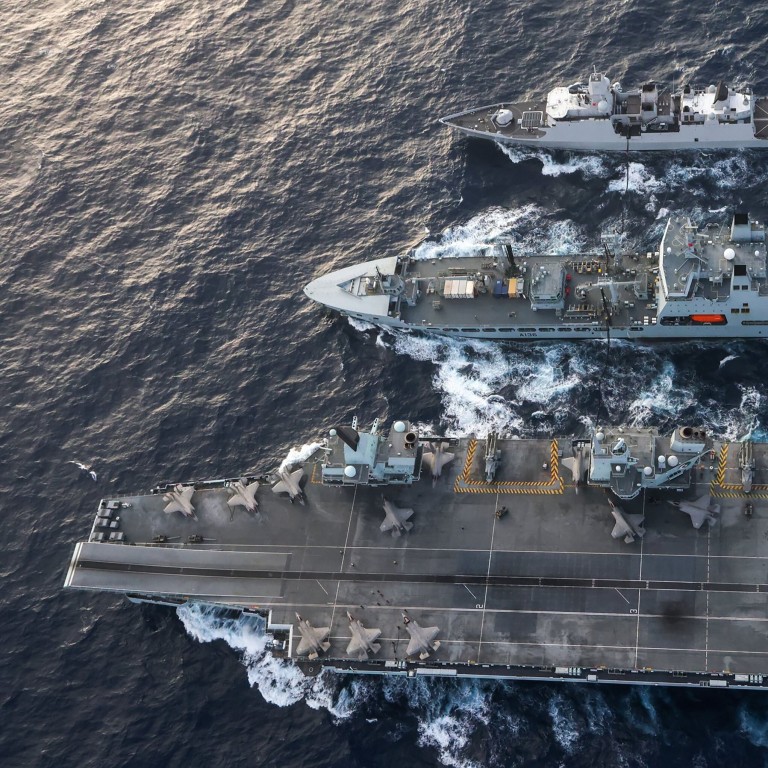
South China Sea: US and China spar over ‘biggest threat’ in disputed waters
- China has ignored rules in advancing unlawful maritime claims, top US diplomat Antony Blinken told a virtual UN Security Council meeting
- Beijing’s ambassador shot back by calling the US the ‘biggest threat to stability’ in flashpoint region
Joining the United Nations Security Council’s maritime security meeting via video link, Blinken took aim at what he called “dangerous encounters between vessels at sea and provocative actions to advance unlawful maritime claims” in the South China Sea, the resource-rich waterway where China’s extensive claims have been contested by Southeast Asian countries including Vietnam, Malaysia, Brunei and the Philippines.
“The United States has made clear its concerns regarding actions that intimidate and bully other states from lawfully accessing their maritime resources. And we and other countries, including South China Sea claimants, have protested such behaviour and unlawful maritime claims in the South China Sea,” Blinken said at the virtual meeting chaired by Indian Prime Minister Narendra Modi and hosted by Indian Foreign Minister Subrahmanyam Jaishankar on Monday.

02:37
Philippines sounds alarm over 200 Chinese ships in the South China Sea
“Conflict in the South China Sea or in any ocean would have serious global consequences for security and for commerce. What’s more, when a state faces no consequences for ignoring these rules, it fuels greater impunity and instability everywhere.”
Blinken’s remarks were soon met with protests from China, with Dai Bing, the Chinese deputy ambassador at the UN, calling the US the “biggest threat to stability in the South China Sea”.
As the only major power to have failed to ratify the UN Convention on the Law of the Sea (Unclos), an international treaty that lays down a comprehensive regime of law and order in the world’s oceans and seas, the US “has no credibility … to act as a judge of the convention and to dictate and interfere with other countries”, Dai said, according to a transcript released on the website of the Chinese mission at the UN.

01:37
China’s PLA conducts air force drills after US warships sail in contested South China Sea
“As an extraterritorial country, the US poses the biggest threat to the stability of the South China Sea, by bringing advanced ships and aircraft into the South China Sea at every turn, provoking recklessly and openly sowing discord among countries in the region. The United States is not qualified to say anything about the South China Sea.”
Last year, Washington hardened its stance against Beijing and claimed that it aligned with the 2016 ruling and China’s expansive maritime claims in most of the South China Sea were “completely unlawful”.
While urging countries to strengthen dialogue and deepen cooperation “on the basis of mutual respect and equal treatment” to deal with the challenges on maritime security, Dai also lashed out what he called efforts by “a few countries in the Asia-Pacific to promote an exclusive strategy for the region”, which he said were “attempting to create and intensify maritime conflicts, undermine the sovereignty and security interests of the countries concerned, and undermine regional peace and stability.”

02:23
Gloves off at top-level US-China summit in Alaska with on-camera sparring
The latest spat comes as tensions continue to flare up in the South China Sea.
Last week, China started military training drills in parts of the waterway in a five-day exercise expected to conclude on Tuesday. This came only days after the US began a large-scale, all-domain 26-day military exercise with Britain, Australia and Japan in the Indo-Pacific region, the first drills of the kind in more than four decades.
The US-led Quad, or the Quadrilateral Security Dialogue, has alarmed Beijing which sees the grouping as a part of efforts to contain China’s influence in the region.

